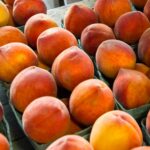MegaFresh an "eBay" for Australian farmers, fresh produce shoppers

Few would argue the food and beverage industry has its fair share of gatekeepers, whether it's the retail buyers who decide what's put on shelves, restaurants choosing inventory for their kitchens or cafés deciding which brand of juice to stock in the fridge.
Spoiled for choice, the businesses involved at the final point of sale can't possibly be on the mark with what consumers 100% of the time.
This is where MegaFresh steps in. The brainchild of Yarra Valley entrepreneur Alex Stefan, the online farmers' market aims to bridge the divide between food producers and consumers.
It was the frustration involved with his own cold-pressed organic juice business "Feast" that led him to the idea.
"I found it very difficult with the juices to get into retailers, stores, cafés and so forth - they were always skeptical, saying 'it's a new brand, we don't know if it's going to sell, it seems a bit expensive'," he tells Fresh Fruit Portal.
"And then at the same time I was getting emails from consumers asking me where they could buy the product, so it became obvious to me that the decision makers at the retail stores weren’t really in touch with their consumers.
"We’ve got technology today - why do we even have retailers, distributors and wholesalers?"
Scale, distribution and networks would probably be the best answers to that question.
"The only obstacle was we needed a central hub in order for farmers and manufacturers to be able to sell their products all on the one platform so consumers don’t have to go to 50 different websites to buy their groceries," Stefan explains.
"When people do their weekly shopping they typically buy 20-50 items, but we don't want to get 20-50 separate deliveries. As consumers we want it to come preferably on the same day, in one box, and preferably for free.
"That's why the central fulfillment model was developed and attached to the website platform."
A soft launch
Stefan says with MegaFresh farmers actually list products themselves, along with prices and supplementary materials like photos of upcoming crops (consumers can even order fruit that hasn't been picked yet) or videos to tell stories directly to consumers.
"We don’t choose the sellers, the sellers choose us, just like eBay...any farmer, any manufacturer is welcome to do so," he says.
"We do provide some guarantees. For example if the product delivered does not meet the specifications that were on the ad, we will give a full refund and then we’ll charge that back to the seller.
"We’re trying to create a free market because currently we have a situation where when I go to Coles or Woolworths the products I see on the shelves are products that have been vetted by the people there."
Because the business is still in its early stages, Stefan says current warehousing space "isn't huge" at less than 1,000 square meters in Melbourne.
"As the business begins to grow and there’s more demand we’ll then simply move to a larger facility, and we’re also setting up warehouses in other cities like Sydney, Brisbane, Adelaide, Perth, etcetera," he says, adding MegaFresh does its own deliveries within metro Melbourne while outsourcing deliveries to other areas.
"We’ve currently got a few dozen suppliers with almost a hundred products in total - suppliers across Victoria and New South Wales. It’s steady as she goes, it’ll keep growing over time,
"I’ve got quite a few farmers and manufacturers who have made enquiries, and a few have told me they are going to sign up."
To afford the endeavor, MegaFresh charges a commission to the farmer on all product sold that includes website hosting, storage in warehouses whether that be in cool rooms, freezers or at ambient temperature, the packing of the product when orders come in and delivery to the customer on behalf of the farmer.
Quality control
To reinforce the business proposition for growers, Stefan highlights MegaFresh also provides a quality testing service for all fresh fruit and vegetables, harnessing the latest technology that allows for very specific measurements.
"Any fresh produce that comes into the warehouse is randomly tested and within 30 seconds we have the result. The test tells us the aroma intensity, the flavor intensity, the level of ripeness and the nutritional profile of the produce," he says, mentioning the technology comes from Israel but the product is still a trade secret.
"That result is then added by warehouse staff onto the listing of the product so that when consumers go to buy fresh produce they can be confident that what they’re looking at is what they’re going to get.
"Many times we go to the supermarket and buy a peach that looks really nice, but when we get home we discover it’s not so nice. This overcomes that issue."
He says it also overcomes the fact consumers often like to handle the fruit to check for quality, and farmers can also sell their product based on quality and not just weight.
"If I produce a peach that has amazing flavor, why would I want to sell it as a farmer at the same price per kilo that the next guy is selling his peaches for which may taste half as good?"
Market comparison
With major retail chains like Coles and Woolworths already offering online home deliveries, along with competition Aussie Farmers Direct, how will MegaFresh set itself apart?
"Aussie Farmers Direct are actually a retailer – they go to the wholesale markets just like any retailer, they buy produce off the wholesalers, they then mark it up and list it on the website and sell it at retail.
"MegaFresh simply provides a platform and delivery service on behalf of the farmer, that’s all – we’re not a wholesale-retail model."
But what about the rise of AmazonFresh?
"Amazon is currently in the process of setting up a warehouse in Dandenong in the southeast of Melbourne. It’s a fairly large one from what I hear – they won’t be doing Amazon Fresh in Australia, from what I’ve heard," he says.
"However the Amazon model is not a direct to consumer model either. They do have a small portion called Amazon Marketplace where sellers can sell direct to consumers via the Amazon platform, but that’s only a portion of their sales.
"The majority of the Amazon model is based once again on the wholesale-retail model where they buy at wholesale from manufacturers and they sell at retail."
Another point of e-commerce comparison could also be Alibaba in China, which has its business-to-consumer platform Tmall.
"Products need to be approved by Alibaba and from what I’ve heard it is quite difficult to get on there and their fees are exorbitant. They do charge a few thousand dollars for them just to list the product," Stefan says.
"We don’t charge anything to list the product. As a manufacturer you have to actually apply to Alibaba to have them list your product, then they will vet it and then if they decide to let your product be sold on their platform they then charge you exorbitant fees and then you could potentially do quite well if you get on there."














































